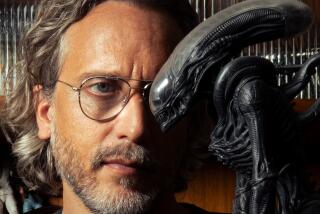‘Untold Story’ of Castro leaves plenty still to tell
- Share via
Although Estela Bravo’s “Fidel: The Untold Story” is purely propaganda, a work of unabashed hero worship, it is nonetheless -- and likely inadvertently -- a timely and invaluable implicit reminder of the role that U.S. foreign policy has played in the rise of Castro, not to mention Osama bin Laden and Saddam Hussein.
Hitler had his Leni Riefenstahl, and now Castro has his Bravo. And if Castro is no Hitler when it comes to evil (though his victims may understandably disagree), then Bravo is no Riefenstahl when it comes to persuasive mythologizing.
The irony of Bravo’s uncritical approach is that after nearly 45 years of rule and involvement in political movements throughout Latin America and in Africa, Castro has more than attained the kind of historical stature that warrants a comprehensive, probing study. But then it is unlikely that Castro would have sat down for a friendly and hardly revealing chat with Bravo, a documentarian who has divided her time between New York and Cuba for 40 years, had he not trusted her to come up with a flattering portrait of him.
The Cuba in which Castro, son of a wealthy sugar-plantation family, came of age in the 1940s and early ‘50s was under the rule of the notoriously corrupt Batista regime, in which U.S. big business -- and the Mafia -- flourished. Havana was a resort noted for its colorful night life and wide-open vice. It is understandable that Castro, trained as a lawyer, fiery and strong-willed, would emerge as an ardent nationalist rebel who, after much bloody struggle, would ride into Havana in 1959 as the successful leader of the Cuban revolution.
The good fortune that helped him withstand many an assassination attempt, the missile crisis, the abortive Bay of Pigs invasion and much other adversity was there from the start: After his triumphant arrival, during his very first speech to the people, a white dove landed on his shoulder, leading many of the devout to believe he must be Christ’s messenger.
It is possible to admire Castro’s standing up to U.S. economic imperialism and to understand why he would turn to the other superpower, the Soviet Union, for support -- and to admire his commitment to education and health care -- while at the same time deploring the excesses of his regime and questioning the wisdom of America’s long-held embargo of Cuba.
Yet the excesses that Bravo chooses to ignore are impossible to overlook: his oppression of free speech; his human rights abuses, including the torture and imprisonment of political dissidents; and the targeting of gays and intellectuals. Bravo, who is scornfully dismissive of Miami’s anti-Castro community, acknowledges that the mass trials Castro held soon after coming to power caused the first hint of dismay from abroad but goes no further than that in explaining why.
Bravo had access to much archival footage and rare photographs; she interviews a wide range of admirers and observers, and has assembled them effectively for her purposes.
The Castro we see is exclusively the public man, giving speeches, meeting with dignitaries and celebrities, and working the crowd. (Bravo tells us that Castro’s private life is so private that his people can only “think” he has eight children and eight grandchildren.) Castro is undeniably charismatic and indefatigable, passionate and articulate in his promotion of his ideas and of himself. For U.S. audiences the key moment may be when Mike Wallace confronts Castro in New York on a United Nations visit and, after reminding him that he had interviewed him early in his rule, asks him point-blank, “So whatever happened to democracy and free elections?” Through an interpreter comes the vague, evasive reply: “We discovered other formulas of democracy, and we discovered it was better than the Americans’.”
Bravo gives Castro the last word in her film, and he comes up with one of his best remarks, calling attention to his frequently observed David-versus-Goliath relationship with the U.S. “We are a very small David, and the U.S. is a very big Goliath,” he says, “but we deserve to be remembered as long as David has.”
*
‘Fidel’
Times guidelines: complex adult themes
A First Run Features release of a Bravo Film and Fort Point Entertainment production. Director Estela Bravo. Executive producers David Frankel, Ernesto Bravo. Cinematographer Roberto Chile. Music Frank Fernandez. Narrator Vlasta Vrana. Running time: 1 hour, 31 minutes.
Exclusively at the Laemmle Fairfax Cinemas, Beverly Boulevard at Fairfax Avenue, (323) 655-4010.
More to Read
Sign up for Essential California
The most important California stories and recommendations in your inbox every morning.
You may occasionally receive promotional content from the Los Angeles Times.













